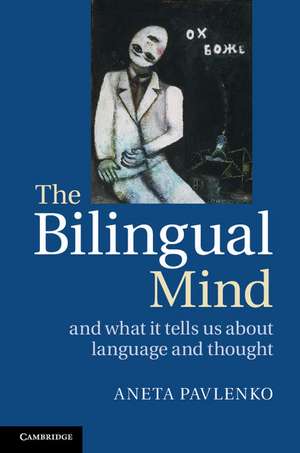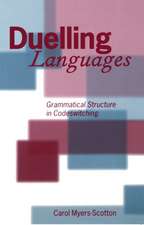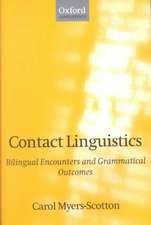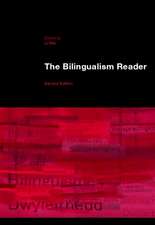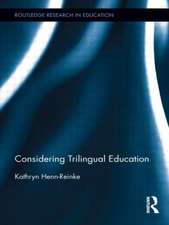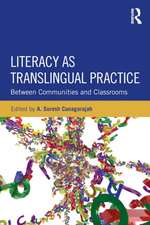The Bilingual Mind: And What it Tells Us about Language and Thought
Autor Aneta Pavlenkoen Limba Engleză Paperback – 5 feb 2014
| Toate formatele și edițiile | Preț | Express |
|---|---|---|
| Paperback (1) | 349.13 lei 6-8 săpt. | |
| Cambridge University Press – 5 feb 2014 | 349.13 lei 6-8 săpt. | |
| Hardback (1) | 504.84 lei 6-8 săpt. | |
| Cambridge University Press – 5 feb 2014 | 504.84 lei 6-8 săpt. |
Preț: 349.13 lei
Nou
Puncte Express: 524
Preț estimativ în valută:
66.81€ • 71.44$ • 55.70£
66.81€ • 71.44$ • 55.70£
Carte tipărită la comandă
Livrare economică 17 aprilie-01 mai
Preluare comenzi: 021 569.72.76
Specificații
ISBN-13: 9780521716567
ISBN-10: 052171656X
Pagini: 400
Ilustrații: 14 tables
Dimensiuni: 150 x 227 x 21 mm
Greutate: 0.57 kg
Ediția:New.
Editura: Cambridge University Press
Colecția Cambridge University Press
Locul publicării:Cambridge, United Kingdom
ISBN-10: 052171656X
Pagini: 400
Ilustrații: 14 tables
Dimensiuni: 150 x 227 x 21 mm
Greutate: 0.57 kg
Ediția:New.
Editura: Cambridge University Press
Colecția Cambridge University Press
Locul publicării:Cambridge, United Kingdom
Cuprins
1. The Sapir-Whorf Hypothesis and the bilingual turn in the study of language and cognition; 2. Material worlds: linguistic categorization of the 'kaleidoscopic flux of impressions'; 3. Multidimensional worlds: number, time, and space as linguistic systems of symbolic relationships; 4. Dynamic worlds: linguistic construal of motion events; 5. Narrative worlds: locating ourselves in storylines; 6. Discursive worlds: inner speech, interpretive frames, and the accomplishment of intersubjectivity; 7. Emotional worlds: emotion categorization, affective processing, and ascription of significance; 8. The bilingual mind and what it tells us about language and cognition: some renegade thoughts.
Recenzii
'A very thoughtful examination not only of bilingualism but of the nature and uses of language generally. It deals with deep issues, but does so with notable clarity.' Jerome Bruner, University Professor Emeritus, New York University
'This is a wonderful book which brings critical insights deriving from a bilingual perspective to bear on linguistic theory in general. While one may disagree with Pavlenko's complete rejection of semantic universals, the book will surely have a galvanizing effect on the study of language and cognition, and many will see it, I expect, as a milestone in the history of linguistics.' Anna Wierzbicka, Australian National University
'Aneta Pavlenko addresses the intriguing relationship between language and thought in bi- and multilinguals in a unique, comprehensive and refreshing manner. Her beautifully written and lively work deserves to become a milestone in the field.' François Grosjean, University of Neuchâtel
'This is a wonderful book which brings critical insights deriving from a bilingual perspective to bear on linguistic theory in general. While one may disagree with Pavlenko's complete rejection of semantic universals, the book will surely have a galvanizing effect on the study of language and cognition, and many will see it, I expect, as a milestone in the history of linguistics.' Anna Wierzbicka, Australian National University
'Aneta Pavlenko addresses the intriguing relationship between language and thought in bi- and multilinguals in a unique, comprehensive and refreshing manner. Her beautifully written and lively work deserves to become a milestone in the field.' François Grosjean, University of Neuchâtel
Notă biografică
Descriere
If languages influence the way we think, do bilinguals think differently in their respective languages?
